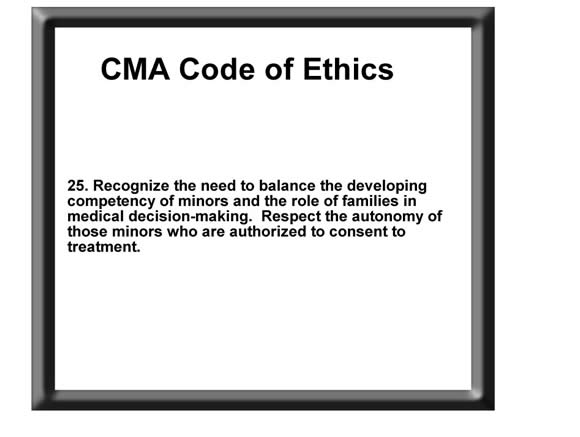Law and Minors
Introduction
The law, as far as minors is concerned has two very different approaches:
- Allows increasing rights with increasing maturity
- Rigid age based "rules" regarding legal rights
The legal category of "minor" begins at birth and ends in the late teens.
Some provinces have a statutory age of consent to medical treatment.
Frequently in law, the age of majority is used to determine when an individual has the capacity to enter certain transactions and relations.
Legislation sets out sets out minimum ages for activities such as driving or drinking alcohol.
The age of majority depends on the province:
| Province | Age of majority | Decisional Capacity |
Comments |
| Alberta | 18 | ||
British Columbia
|
19 | In BC a minor may give effective consent to health care if the HCP is satisfied that:
|
|
| Manitoba | 18 | 16 | Presumption is that patients over 16 years have capacity and those under do not |
| New Brunswick | 18 | 16 | Consent under the age of majority may be considered as effective as an adult's if in the opinion of two physicians:
|
| Newfoundland | 19 |
|
|
| Nova Scotia | 19 | ||
| Nunavut | 19 | ||
| Ontario | 18 | No distinction based on age. Depends on if they have "capacity" as defined in legislation |
|
| PEI | 18 | ||
| Quebec | 18 | 14 | Court and parents can over-ride |
| Saskatchewan | 18 | ||
| The Yukon | 19 |
Needs and abilities vary widely in this disparate group.
The law attempts to recognize the wide variation of ability and give young people increasing legal power as they mature.
Generally, consent under the age of majority may be considered as effective as an adult's if in the opinion of two physicians:
- therapy is in the child's best interests
- child can understand treatment's nature and consequences
Capacity
- In order to give informed consent to therapy, the person concerned must be decisionally capable.
- Capacity is not age specific, but depends on intellectual maturity.
- The legal test for capacity is a cognitive one
- Capacity refers to a person's ability to understand:
- The information relevant to making a decision about therapy.
- The "reasonably forseeable" consequences of a decision to undergo treatment or not.
- Capacity is a legal construct.
Medical treatment of minors can raise complex issues:
- Capacity can be viewed as meaning "all or nothing" so it can be difficult to apply as development changes continuously and different aspects of that person may be at different levels of maturity - for example emotional v intellectual maturity.
- Where the child cannot yet make treatment decisions, the parents have the power and obligation to do so.
- Elective medical treatment of a child without the parents consent can constitute a battery.
- Sometimes when parents fail to consent or obtain needed medical treatment for their child, the result may be apprehension by the child welfare authorities and legal proceedings to have the child declared "in need of protection".


